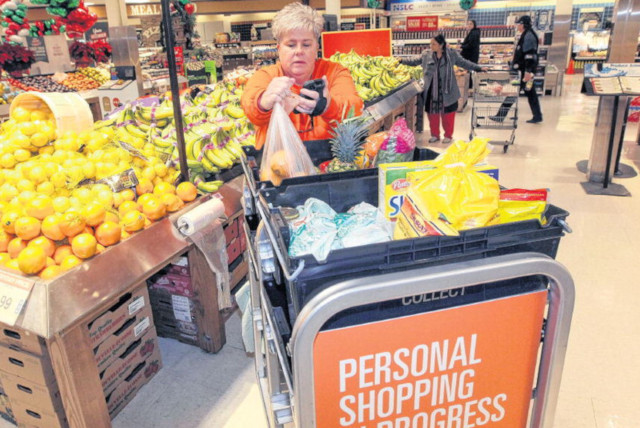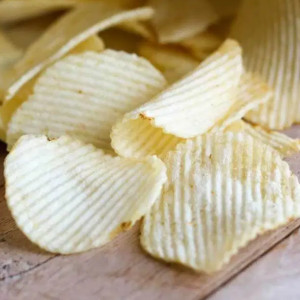It’s bad enough to be cooped up in your home waiting out the COVID-19 pandemic with little to do but housework, and watching Netflix. But when you start to wonder if you have enough food on hand, or of it’s nutritious enough, you could be adding food anxiety to your menu…
 Programs such as Loblaws Click and Collect personal shopping service
Programs such as Loblaws Click and Collect personal shopping service
can help lower your anxiety about going out to the supermarket…
Food anxiety is what some dieticians and cabin fever experts are calling a phenomenon that’s starting to rear its ugly head among us as we do out best to follow the government’s suggestions (and, in some jurisdictions, orders) to stay home. There are a number of concerns behind this nasty development, most of which aren’t really as serious as we might think…
Can COVID-19 be transmitted through food?
Virus experts say it’s unlikely the virus is being transmitted through food, though it’s theoretically possible. One thing that’s known for sure is, COVID-19 is destroyed during cooking at the usual oven and stove top temperatures. Another piece of associated good news is, the virus has limited viability in the open on surfaces. Remember, it’s mainly transmitted via moisture droplets from coughs and sneezes.
How effective is hand washing as a deterrent?
Hand washing remains the preferred means of keeping your hands free of bacteria and viruses. COVID-19 and other coronaviruses have a fatty outer shell which Soap dissolves, leaving the interior contents of the particle to disintegrate. The Centers for Disease Control (CDC) counsel: “Wash your hands often with soap and water for at least 20 seconds especially after you have been in a public place, or after blowing your nose, coughing, or sneezing.”
Hand sanitizer is a convenient way to kill bacteria and viruses on your hands, but the World Health Organization stresses that it’s always preferable to wash your hands in the approved manner with Soap and warm Water. Hand san should be considered a stop-gap measure to tide you over until you have the opportunity wash your hands.
Is there a food shortage?
No! Food producers and wholesalers stress that there’s plenty of food in the supply chain. And as of this posting, there’s been no trouble getting it to the stores. So you should not be seeing any jacked-up prices or limits on how many items you can buy at one time – unless we’re talking about toilet paper, facial tissue or hand sanitizer. Of course, those aren’t food items, so they don’t really count in the context of this post.
What foods should I eat to fight COVID-19?
There are no specific foods that will directly aid your battle against the virus. Your best bet is to maintain a healthy, balanced diet high in antioxidants and the vitamins and minerals that support your immune system.
Is it safe to visit the grocery store?
Yes, but Ottawa registered dietician Debora Sloan told The Canadian Press it’s a bad idea to browse or doddle: “People are clearly afraid to go (to grocery stores) and trying to limit their time there is probably a good idea.” Knowing what’s in your fridge and pantry before you go shopping, and planning your meals ahead for at least a week will help you get in and out of the store faster.
Many supermarkets are dedicating certain shopping hours to staff-assisted seniors’ shopping. Typically, they are setting aside their first open hour in the morning (often 8 a.m. to 9 a.m.) for this purpose. If you’re older, call your fave supermarket to see if they are offering this service. It will get you in and out faster.
Some supermarket chains also offer call-ahead ordering services, under which you phone your order in or file it via the internet, store staff go around and pick out your purchases and bag them up, and then run them out to your car when you drive up. If your supermarket of choice usually offers this option, call ahead to make sure they are still supporting it during the pandemic.
Are canned and frozen foods okay?
Sloan notes that some foods are better bets than others during a pandemic crisis, when fresh produce is often in short supply. Canned and frozen foods are often given short shrift by dieticians and Chefs, and relegated to ‘if you have to’ status. However, Toronto dietician Jonathan Conti extols the virtues of frozen produce:
“The benefit of frozen vegetables is that they are harvested at peak freshness, blanched and flash frozen to preserve their nutritional value,” Conti told The Canadian Press. “I tend to pick the frozen vegetables that would take a longer time to prepare when fresh. For example, frozen butternut squash, broccoli, cauliflower, and spinach are nutrient-rich options that take minimal time to cook [from frozen].”
Why am I eating more?
Because you have the opportunity. Temptation strikes when you’re not paying attention. Snacking and ‘mindless eating’ most often occur when you’re doing something sedentary, such as binge-watching your favourite TV series or are simply bored. Find something to do and do it.
“Being home all the time increases access to food in the house and that can be problematic for people who are snackers or emotional eaters,” Sloan noted. “People are stressed out because there’s a lot going on right now and they might be doing more snacking than they would if they were at work or at school or going about their regular business. So it’s more important in the next while to just stay in tune: Why am I eating? Am I actually hungry? Is this going to satisfy my hunger? Am I eating out of stress? Am I eating because I’m bored?”
Side note: Sales of junk food have soared since the COVID-19 ‘stay home’ era began.
And there you have it…
With a little planning and concerted mindfullness, you can weather the COVID-19 pandemic without worries about food.
~ Maggie J.

